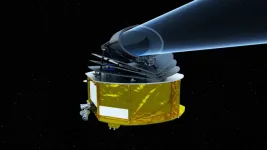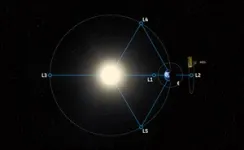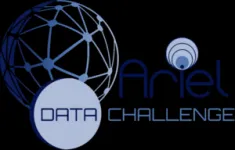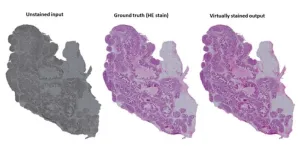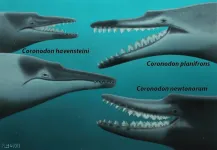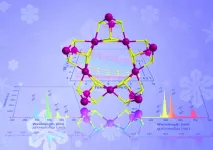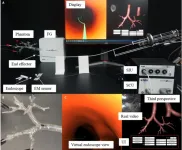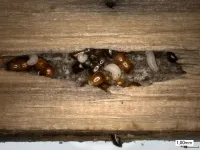(Press-News.org)
Artificial Intelligence (AI) experts have been challenged to help a new space mission to investigate Earth’s place in the universe.
The Ariel Data Challenge 2023, which launches on 14 April, is inviting AI and machine learning experts from industry and academia to help astronomers understand planets outside our solar system, known as exoplanets.
Dr Ingo Waldmann, Associate Professor in Astrophysics, UCL (University College London) and Ariel Data Challenge lead said:
“AI has revolutionised many fields of science and industry in the past years. The field of exoplanets has fully arrived in the era of big-data and cutting edge AI is needed to break some of our biggest bottlenecks holding us back.”
Understanding our place in the universe
For centuries, astronomers could only glimpse the planets in our solar system but in recent years, thanks to telescopes in space, they have discovered more than 5000 planets orbiting other stars in our galaxy.
The European Space Agency’s Ariel telescope will complete one of the largest-ever surveys of these planets by observing the atmospheres of around one-fifth of the known exoplanets.
Due to the large number of planets in this survey, and the expected complexity of the captured observations, Ariel mission scientists are calling for the help of the AI and machine learning community to help interpret the data.
Ariel Data Challenge
Ariel will study the light from each exoplanet’s host star after it has travelled through the planet’s atmosphere in what is known as a spectrum. The information from these spectra can help scientists investigate the chemical makeup of the planet’s atmosphere and discover more about these planets and how they formed.
Scientists involved in the Ariel mission need a new method to interpret these data. Advanced machine learning techniques could help them to understand the impact of different atmospheric phenomena on the observed spectrum.
The Ariel Data Challenge calls on the AI community to investigate solutions. The competition is open from 14 April to 18t June 2023.
Participants are free to use any model, algorithm, data pre-processing technique or other tools to provide a solution. They may submit as many solutions as they like and collaborations between teams are welcomed.
This year, the competition also offers participants access to High Powered Computing resources through DiRAC, part of the UK’s Science and Technology Facilities Council’s computing facilities.
Kai Hou (Gordon) Yip, Postdoctoral Research Fellow at UCL and Ariel Data Challenge Lead said:
“With the arrival of next-generation instrumentation, astronomers are struggling to keep up with the complexity and volume of incoming exo-planetary data. The ECML-PKDD data challenge 2023 provides an excellent platform to facilitate cross-disciplinary solutions with AI experts.”
The competition
Winners will be invited to present their solutions at the prestigious ECML conference. The top three winning teams will be receive sponsored tickets to ECML-PKDD in Turing or the cash equivalent.
Winners will also be invited to present their solutions to the Ariel consortium.
The UK Space Agency, Centre National d’Etudes Spatiales (CNES), European Research Council, UKRI Science and Technology Funding Council (STFC), European Space Agency and Europlanet Society support the competition.
For the first time, DiRAC is providing free access to GPU computing resources to selected participants. The application is open for all.
Previous competition
This is the fourth Ariel Machine Learning Data challenge following successful competitions in 2019, 2021 and 2022. The 2022 challenge welcomed 230 participating teams from across the world, including entrants from leading academic institutes and AI companies.
This challenge and its predecessor have taken a bite-sized aspect of a larger problem to help make exoplanet research more accessible to the machine-learning community. These challenges are not designed to solve the data analysis issues faced by the mission outright but provide a forum for new ideas, discussions and to encourage future collaborations.
More details about the competition and how to take part can be found on the Ariel Data Challenge website. Follow @ArielTelescope for more updates.
END
The researchers of the FinEst Centre for Smart Cities of Tallinn University of Technology (Estonia, Europe) developed the DigiAudit platform to monitor and analyse energy use and indoor climate indicators of buildings and large real estate portfolios in real time. Thinnect, an Estonian IoT start-up company, will help sell the solution and market it worldwide.
We can only reach zero-emission buildings when we have reliable data
The European Union has set a target for all buildings to be zero-emission, or near-zero energy, by 2050. However, there is no reliable data on the energy consumption of many buildings, so it is not possible to monitor the condition ...
Researchers from the University of Eastern Finland, the University of Turku, and Tampere University have developed an artificial intelligence-based method for virtual staining of histopathological tissue samples as a part of the Nordic ABCAP consortium. Chemical staining has been the cornerstone of studying histopathology for more than a century and is widely applied in, for example, cancer diagnostics.
“Chemical staining makes the morphology of the almost transparent, low-contrast tissue sections visible. Without it, analysing tissue morphology is almost impossible for human vision. Chemical staining is irreversible, and in most ...
Québec City, April 14, 2023 - Fuchs' endothelial corneal dystrophy, a degenerative eye disease, causes progressive vision loss that can induce blindness. It is the leading cause of corneal transplantation, but the scarcity of grafts hinders its treatment. A research team from Université Laval and Université de Montréal has identified a way to slow the disease and even avoid transplantation if diagnosed at an early stage.
In people with the disease, the endothelial cells at the back of the cornea die more quickly than in healthy people. "Everyone loses them at a slow rate, slow enough to make it to the end of our lives ...
A new study published in the journal PeerJ by Robert W. Boessenecker (CofC), Brian L. Beatty (NYIT), and Jonathan H. Geisler (NYIT) reports a wealth of new fossils of the early toothed baleen whale Coronodon from Oligocene (23-30 million years old) rock layers near Charleston, South Carolina. These include five new skulls, representing two new species: Coronodon planifrons and Coronodon newtonorum, and young juveniles of Coronodon havensteini – first named from a single skull by this team in 2017. Coronodon is one of the most primitive members ...
While the wheel does not need to be reinvented, there are benefits to the development of new nano-wheels, according to a multi-institute research team based in China. The group fabricated a novel family of metallic compounds, each of which exhibit unique properties desirable for next-generation technologies, such as advanced sensors.
Their findings were made available online on March 12 in Polyoxometalates.
“Polymetallic complexes are of great interest not only for their appealing molecular structure but also ...
There is a need for new drugs. For example, many of the antibiotics that we have been using for a long time are becoming less effective. Chemists and pharmaceutical scientists are frantically searching for new active substances, especially those that can penetrate cell membranes, as these are the only ones that patients can take orally in the form of a tablet or syrup. Only these active ingredients pass through the intestinal wall in the small intestine and enter the bloodstream to reach the affected area in the body. For active ingredients that cannot penetrate the cell membrane, physicians have no choice but to inject them directly into ...
Cancers are notoriously known for their high mortality rate and increasing incidence worldwide. Among them, lung cancer is arguably one of the most devastating ones. According to the World Cancer Research Fund International, lung cancer was the second most common cancer around the world in 2020, with more than 2.2 million new cases and 1.8 million deaths.
However, lung cancer, like other cancers, is easier to treat if caught earlier. “The reported 1-year survival rate for stage V is just 15% to 19% compared with 81% to 85% for stage I, which means that the early ...
Chemotherapy is associated with an increased risk of treatment-related heart damage, including heart failure and cerebrovascular disease, for many patients. But a new meta-analysis, presented at the American College of Cardiology’s Advancing the Cardiovascular Care of the Oncology Patient 2023 conference, finds that Black patients or patients of African ancestry have 71% higher odds of cardiotoxicity following cancer treatment compared to White patients.
Cardiotoxicity is any heart damage stemming from cancer treatment or drugs, including ...
WASHINGTON—On World Quantum Day, Optica Publishing Group announced it will begin publishing a new journal in September 2023 dedicated to highly selective results in quantum information science and technology (QIST). The new journal, Optica Quantum, joins the Society’s portfolio of the most-cited journals in optics and photonics and will provide the community with articles of the same exceptional standards for quality, novelty, and significance as its parent journal, Optica.
The concept of quantum light serves as a foundation for many quantum technologies and ongoing ...
The alnus ambrosia beetle Xylosandrus germanus, also known as the black stem borer, was accidentally introduced by humans from its native east Asia to North America and Europe around the beginning of the 20th century. X. germanus is a so-called ambrosia beetle, which means that it farms its own food: a specialized fungal symbiont which it ‘sows’ and tends inside the galleries that it digs inside wood. It is a destructive invasive pest, known to attack more than 200 species from 51 families of broadleaf and conifer trees. While it prefers to colonize dead ...
